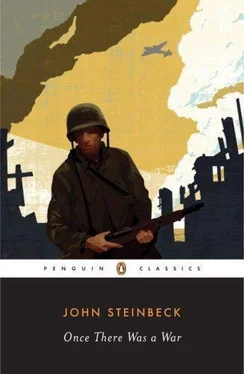John Steinbeck - Once there was a war
Здесь есть возможность читать онлайн «John Steinbeck - Once there was a war» весь текст электронной книги совершенно бесплатно (целиком полную версию без сокращений). В некоторых случаях можно слушать аудио, скачать через торрент в формате fb2 и присутствует краткое содержание. Город: New York, Год выпуска: 1960, Издательство: Bantam Books, Жанр: Классическая проза, на английском языке. Описание произведения, (предисловие) а так же отзывы посетителей доступны на портале библиотеки ЛибКат.
- Название:Once there was a war
- Автор:
- Издательство:Bantam Books
- Жанр:
- Год:1960
- Город:New York
- ISBN:нет данных
- Рейтинг книги:3 / 5. Голосов: 1
-
Избранное:Добавить в избранное
- Отзывы:
-
Ваша оценка:
- 60
- 1
- 2
- 3
- 4
- 5
Once there was a war: краткое содержание, описание и аннотация
Предлагаем к чтению аннотацию, описание, краткое содержание или предисловие (зависит от того, что написал сам автор книги «Once there was a war»). Если вы не нашли необходимую информацию о книге — напишите в комментариях, мы постараемся отыскать её.
Once there was a war — читать онлайн бесплатно полную книгу (весь текст) целиком
Ниже представлен текст книги, разбитый по страницам. Система сохранения места последней прочитанной страницы, позволяет с удобством читать онлайн бесплатно книгу «Once there was a war», без необходимости каждый раз заново искать на чём Вы остановились. Поставьте закладку, и сможете в любой момент перейти на страницу, на которой закончили чтение.
Интервал:
Закладка:
While the correspondent is writing for you of advances and retreats, his skin will be raw from the woolen clothes he has not taken off for three days, and his feet will be hot and dirty and swollen from not having taken off his shoes for days. He will itch from last night’s mosquito bites and from today’s sand-fly bites. Perhaps he will have a little sand-fly fever, so that his head pulses and a red rim comes into his vision. His head may ache from the heat and his eyes burn with the dust. The knee that was sprained when he leaped ashore will grow stiff and painful, but it is no wound and cannot be treated.
“The 5th Army advanced two kilometers,” he will write, while the lines of trucks churn the road to deep dust and truck drivers hunch over their wheels. And off to the right the burial squads are scooping slits in the sandy earth. Their charges lie huddled on the ground and before they are laid in the sand, the second of the two dog tags is detached so that you know that that man with that Army serial number is dead and out of it.
These are the things he sees while he writes of tactics and strategy and names generals and in print decorates heroes. He takes a heavily waxed box from his pocket. That is his dinner. Inside there are two little packets of hard cake which have the flavor of dog biscuits. There is a tin can of cheese and a roll of vitamin-charged candy, an envelope of lemon powder to make the canteen water taste less bad, and a tiny package of our cigarettes.
That is dinner, and it will keep him moving for several more hours and keep his stomach working and his heart pumping. And if the line has advanced beyond him while he eats, dirty, bug-like children will sidle up to him, cringing and sniffling, their noses ringed with flies, and these children will whine for one of the hard biscuits and some of the vitamin candy. They will cry for candy: “ Caramela — caramela — caramela —okay, okay, shank you, good-by.” And if he gives the candy to one, the ground will spew up more dirty, bug-like children, and they will scream shrilly, “ Caramela — caramela .” The correspondent will get the communiqué and will write your morning dispatch on his creaking, dust-filled portable: “General Clark’s 5th Army advanced two kilometers against heavy artillery fire yesterday.”
SOMEWHERE IN THE MEDITERRANEAN WAR THEATRE, October 8, 1943 —
The invasion and taking of the beachhead at Salerno had been very rough. The German was waiting for us. His.88s were on the surrounding hills and his machine guns in the sand dunes. His mines were in the surf and he sat there and waited for us. There was no other way. He had to be pushed out. And, for a time, it looked as though we might be pushed out. But gradually, what with the naval ships firing and the determined holding out of recently green troops and the coming of our reserves from the sea, the picture has changed. Now the invasion fleet lies in comparative safety off the shore and the beach is secure.
The sea has been smooth during the whole thing. Any storm would have made it more difficult, but the sea has been kind to us. It is as slick as silk and littered for many miles with little twinkling C-ration cans floating in the sea and glittering under the sun. The water is oily, too, and there are bits of wreckage floating everywhere and all the garbage of this huge fleet, the crates and cans and bottles and debris that men have the ability to scatter about.
Near shore the cruisers and battleships continue to fire, but now their guns are elevated and they fire over the mountains at targets unseen from the sea.
The command ship lies protected in the middle of the invasion fleet. She is a floating radio station. From her all the orders have gone out and to her all the news has come in. And the staffs are brutally tired. This has not been the usual thing. The command ship has been bombed at constantly. Her crew has been alerted every half-hour in the twenty-four. The bugle is blown and then the boatswain’s pipe over the loudspeaker and then the crackling horn that means battle stations. Then tired staff officers have taken off their helmets and their lifebelts and made for the deck for their assigned stations, while the anti-aircraft roared over their heads and the bombs came down and burst the water into the air.
Not many German planes have got through the air cover, but some have and nearly every one was after the command ship. They have straddled her with bombs. There have been near misses that jerked her in the water and it is a wonder her plates aren’t sprung.
And this has been going on for four days. No one has had any sleep. What has made it even worse, the Jerry planes have been talking to each other on their radios and not bothering to code their messages. They have been looking for this particular ship and aiming for her. They know that if they get this ship they may get the controlling brains of the whole operation.
There are very tired colonels and generals on board, waiting for the order to go ashore and establish headquarters. They will feel much better when they are ashore. It is not nice to be aboard the target of the whole fleet. But the command ship has not been hit. Other ships about her have been blasted, but not the command. The feeling aboard has been that the luck is getting pretty thin and that the next one must get her.
Meanwhile, the litter spreads out to sea on little currents. There will be C-ration cans come ashore for a thousand miles. The litter will coat the shores of Italy.
What has made the command ship’s life even more lively is that the Germans have a new bomb. At least, that is the rumor. This bomb is released and then controlled from the plane. It is directed by radio, and if it seems about to miss it can be turned by its master. At least that is what is said. And surely these bombs do not seem to act like other ones. They come down more slowly, and they glow as they come, with something like a phosphorescence that you can even see in the daytime.
When the red signal for an air attack goes out, the destroyers move in circles, belching smoke, and the small smoke carriers dart busily among the big ships, trailing ribbons of white, choking smoke which smells like sulphur. The little boats weave in and out, until they have covered the fleet with their artificial fog. The sound of coughing is deafening. At least it is until the anti-aircraft starts. And then, through the smoke, you hear the deep blow of the bombs. They don’t sound like anything else. And their explosions come through the water and strike the ship. You can feel them in your feet.
The endless lines of landing craft go ashore, carrying the supplies for men who are lying off in the bushes on the forward lines. Cases of food and tons of shells and cartridges. A hell of them lines the shore, waiting to be transported inland.
And the battle line has moved up. The beach is taken now and the invasion moves ahead. The white hospital ships move inshore to take on their cargoes.
PALERMO
SOMEWHERE IN THE MEDITERRANEAN THEATER, October 1, 1943 —
The sea off Sicily was running in long, smooth waves without whitecaps and the day was bright and the sea that Mediterranean blue that is unlike any other blue in the world. The PT boat ground its way through, making a great churned wake and taking even what little sea there was over the bow. It’s the wettest boat of all, the torpedo boat. The crew, in their rubber clothes, huddled on the deck trying to keep out of the constant spray, and on each side of the bridge the machine-gunners, at their stations, sat in their turrets behind their guns and the water glistened on their faces. The cartridge cases of the.50-caliber shells were green from contact with the sea water.
Off to the right a body was floating in the sea, rising and falling on the long waves. It was pretty swollen, and the brown lifebelt and collar made it float high in the water.
Читать дальшеИнтервал:
Закладка:
Похожие книги на «Once there was a war»
Представляем Вашему вниманию похожие книги на «Once there was a war» списком для выбора. Мы отобрали схожую по названию и смыслу литературу в надежде предоставить читателям больше вариантов отыскать новые, интересные, ещё непрочитанные произведения.
Обсуждение, отзывы о книге «Once there was a war» и просто собственные мнения читателей. Оставьте ваши комментарии, напишите, что Вы думаете о произведении, его смысле или главных героях. Укажите что конкретно понравилось, а что нет, и почему Вы так считаете.









